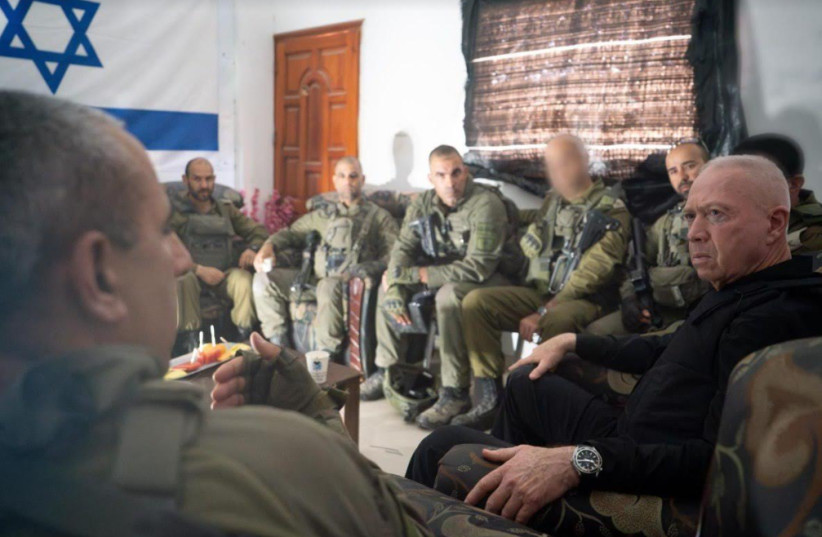Government negotiations over haredi IDF enlistment are at a standstill after both sides agreed to roughly 80% of an ultra-Orthodox draft bill, Defense Minister Yoav Gallant said Sunday evening.
The defense minister, who spoke to the press after visiting IDF soldiers in Rafah, noted that agreements can still be reached, stressing that the IDF needs more soldiers “in the immediate term.”
Gallant claimed that disputes between haredi factions and war cabinet minister Benny Gantz centered around each side’s stubbornness, with haredim accusing Gantz of leveraging the draft issue to force an agreed-upon date for elections.
"The Haredi sector wants to serve"
“I expected Gantz to rise above and showcase the necessary leadership needed and he has not done that. There is still time to take a step forward, for Gantz as well.”
Gallant reaffirmed that he would not support a bill that is not supported by a large majority of the Israeli population, warning that such a bill would become a point of contention for a majority of IDF soldiers to the point of reaching “unwanted phenomena,” alluding to a recent viral clip of a soldier the IDF top brass suspects of attempted mutiny.

During the briefing, Gallant revealed he had received a letter from dozens of IDF combat soldiers and officers, many of whom are part of the Religious Zionism sector, who wrote that “everyone needs to serve.”
“Soldiers on the battlefield are waiting for us to show solidarity, they are waiting for true Zionist words from this government. They are angry that elected officials act in certain ways and blame one another,” Gallant added.
Gallant also said that the Defense Ministry had worked tirelessly since October 7 to prepare the IDF, “from pilot training to Unit 8200,” to accommodate the haredi lifestyle.
The defense minister further revealed the eight-point outline of the draft bill negotiations, saying that five points had been agreed in principle and he confirmed that talks had stalled due to disagreements on three points.
Gallant said that all sides had agreed that the initial rate of haredi integration into the IDF for the first year should stand at 25% of the eligible population, rising to 50% within five years. One conflict that arose in the talks, Gallant said, was over whether this rate of integration would be decided upon in a government vote or through Knesset hearings.
Another issue was one of financial sanctions to be imposed on yeshivot and haredi institutions which fail to meet the threshold for haredi integration into the Israeli military, Gallant said. Lastly, the final major obstacle in talks as per the defense minister was deciding upon an alternate route if the outline agreed upon should fail to yield positive results within three years.
“No agreements were made [on these issues] but it is not a dramatic gap. To me, this is a moment where our nation is tested...this is crucial for both cultural and operational purposes.”
Gallant added, “The haredi sector wants to serve...we find ourselves fighting on seven separate fronts, the public will not forget those who put their political interests above national ones. “This is not about politics – it’s about math,” he said.
